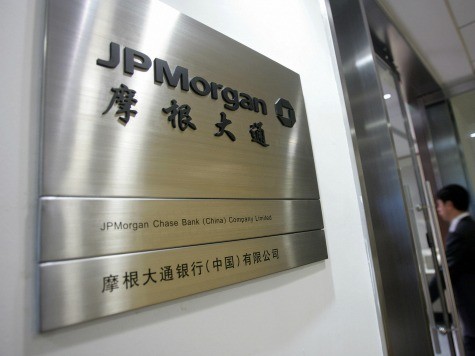
A joint investigation by the U.S. Department of Justice, Hong Kong Department of Justice, and the UK Ministry of Justice into accusations that American investment banks hired the children of powerful Asian officials to secure lucrative securities business may have just ensnared JPMorgan Chase CEO Jamie Dimon.
According to confidential emails recently turned over to federal authorities as part of an investigation into bank hiring practices, a top Chinese regulator personally went to Mr. Dimon’s New York office in June 2012 to ask for a “favor” to hire a young family friend, who later was provided an intern job and now works at JPMorgan. The investigation centers on whether the banks’ hiring of such family members is a violation of the Foreign Corrupt Practices Act of 1977, which makes it illegal to provide pay-to-play incentives to foreign officials.
Several people have acknowledged target letters have been sent to JPMorgan, Goldman Sachs Group Inc., and Morgan Stanley by the enforcement division of the Securities and Exchange Commission (SEC) and the Justice Department prosecutors in Brooklyn that are handling the investigation. Subpoenas requested documents from the banks as leaders in international equity sales by Chinese companies over the last five years. The investigation seeks information about the investment banks’ hiring practices as it relates to the employment of children of senior officials at four of China’s biggest state-owned enterprises that have provided significant business to the banks.
The industry investigation accelerated last year after the SEC obtained a JPMorgan spreadsheet showing the bank was tracking how many underwritings it won in relationship to each Asian applicant it hired. It appears that the Justice Department then began looking into possible violations of securities and bribery laws.
On February 9th, it was revealed that Mr. Dimon, as CEO of JPMorgan, met Mr. Xiang Junbo, China’s top insurance regulator, in his New York office in June 2012. At the time of the meeting, JPMorgan was seeking lucrative work from Chinese insurance companies. As the top insurance regulator, Mr. Xiang was expected to have key influence on the financial dealings of Chinese insurers.
According to a report in The New York Times, “The applicant acted as an interpreter for the Chinese insurance regulator.” Although Mr. Dimon supposedly did not know that Mr. Xiang would ask the bank to hire the interpreter at the meeting, it was later revealed that “JPMorgan bankers in Hong Kong, hoping to help her job prospects, knew in advance that she would attend.”
As the meeting with Mr. Dimon was wrapping up, interviews and the confidential email show, Mr. Xiang changed the subject to include his young interpreter. He introduced her to Mr. Dimon as the daughter of a close friend and as a potential JPMorgan employee. The interpreter translated as Mr. Xiang praised the benefits that she could offer to JPMorgan. Mr. Dimon then told Mr. Xiang that the bank would “do what we can.”
In the confidential email sent after the meeting, a JPMorgan banker in Hong Kong recounted how Mr. Xiang asked Mr. Dimon “for favor to retain her in US team.” The banker, who worked on deals with Chinese-based insurance companies, emphasized “the importance of this relationship and specialty in the insurance area,” adding that “we will be expected to find a solution for her quickly.”
Following approval by the bank’s compliance department and vetting of the applicant through a series of interviews, JPMorgan created a “special internship” to accommodate the applicant, according to the people briefed on the situation. In early 2013, JPMorgan assigned her to the insurance group at the bank’s New York headquarters, and she later became a full-time employee at the bank.
JPMorgan was hired by The People’s Insurance Company of China, a state-owned insurer, for its November 2012 IPO. That same month, JPMorgan was also the co-lead underwriter on China Taiping Capital Ltd.’s $297 million debt offering, according to Capital IQ. The holding company of China Taiping again picked JPMorgan as an adviser when the insurer acquired stakes in a number of subsidiaries last May.
A JPMorgan spokesman stated Mr. Dimon is not under investigation and had nothing to do with the decision to hire the young woman, whom the bank described as “well qualified.” He also emphasized that “like the C.E.O. of any large company, Mr. Dimon can be expected to meet with many people in a given day.”
Investigators are questioning at least seven banks about whether “pay-to-play” hiring practices by the banks might involve some improper relationships. Goldman Sachs, the leader in international equity offerings of Chinese companies in 2013, hired children of senior executives at New China Life Insurance Co. and China Petrochemical Corp., referred to as Sinopec Group. Morgan Stanley brought in an analyst whose father is both a top official of the Chairman of China National Building Material Co. and China National Pharmaceutical Group Corp., referred to as Sinopharm.
Federal authorities could bring charges against any of the seven banks if their hiring practices were designed explicitly to win business from Chinese companies. The Foreign Corrupt Practices Act of 1977 (FCPA) makes it illegal to provide pay-to-play incentives to foreign officials in the form of an “offer, payment, promise to pay, or authorization of the payment of money or anything of value to any person” to influence the foreign official in his or her official capacity.
Since 2009, the Department of Justice has entered into more than 40 corporate settlements for violation of the FCPA. These investigations have resulted in nine of the top ten monetary settlements in FCPA history, including more than $2 billion in fines recovered. Given the many billions of dollars in fees generated by Chinese initial public offerings over the last few years, violations of the FCPA by U.S. investment banks could be subject to record fines and penalties.

COMMENTS
Please let us know if you're having issues with commenting.